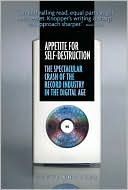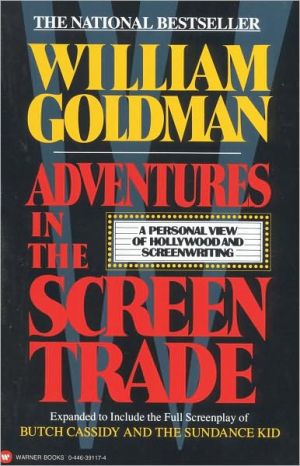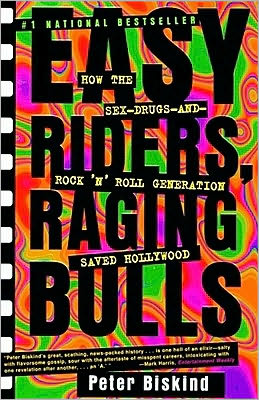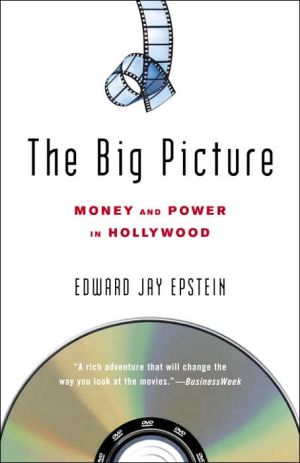Appetite for Self-Destruction: The Spectacular Crash of the Record Industry in the Digital Age
Search in google:
For the first time, Appetite for Self-Destruction recounts the epic story of the precipitous rise and fall of the modern recording industry, from an author who has been writing about it for more than ten years. With unparalleled access to those intimately involved in the music world’s highs and lows—including Warner Music chairman Edgar Bronfman Jr., renegade Napster creator Shawn Fanning, and more than 200 others—Steve Knopper is the first to offer such a detailed and sweeping contemporary history of the industry’s wild ride through the past three decades. From the birth of the compact disc, the explosion of CD sales, and the emergence of MP3-sharing websites that led to iTunes, to the current collapse of the industry as CD sales plummet, Knopper takes us inside the boardrooms, recording studios, private estates, garage computer labs, company jets, corporate infighting, and secret deals of the big names and behind-the-scenes players who made it all happen. Just as the incredible success of the CD turned the music business into one of the most glamorous, high-profile industries in the world, the advent of file sharing brought it to its knees, and Knopper saw it all. The Barnes & Noble Review To name one's new publishing venture "Soft Skull Press" implies many things. A disdain for the academy, and for stodgy or highbrow markets and products. A freshness and flexibility akin to an infant's malleable fontanelles. Or perhaps even a diseased mutant condition involving skeletal melting, straight out of a Ray Bradbury story. When you learn that the founder of Soft Skull, Sander Hicks, also sang in a punk group called White Collar Crime, his 1992 decision to christen his fledgling firm in such an outrageous and unlikely manner coheres entirely. Since its inception, Soft Skull has made its name by publishing a wide variety of entertainingly transgressive volumes positioned somewhere along the axis defined earlier by RE/Search and Semiotext(e) and, in parallel, by their contemporary, powerHouse (founded in 1995). Under publisher Richard Nash, from 2001 to 2009 Soft Skull ramped up both its output and its industry and media profiles, offering such well-received titles as David Rees's Get Your War On and Lydia Millet's Oh Pure and Radiant Heart. Sold to Counterpoint in 2007, the imprint remains very much its own master, under the current guiding hand of Editorial Director Denise Oswald. As a journalist for Rolling Stone, Steve Knopper has cultivated a smooth, confident, engaging narrative voice that perfectly delivers the highly readable goods in Appetite for Self-Destruction. But his storytelling prowess is abetted by the perfect subject matter: the "dirty sexy money" world of pop music. Focusing not on the art itself but on the business side of recorded music, and employing assiduous research with the benefit of 20-20 hindsight, Knopper chronicles the alternately sordid, hilarious, and educational tale of how the industry undid itself, mismanaging enormous sales into a cratered market. Peopling his book with sharply delineated celebrities -- Tommy Mottola, Edgar Bronfman, Jr. -- as well as such unsung players as James T. Russell, arguably the man who invented the CD, and Karlheinz Brandenburg, a seminal contributor to the creation of the MP3 format, Knopper shows us the larger-than-life fallout of short-sighted capitalism and greed and luddite ignorance. The book is a brilliant, vinegar-laced litany of failure that holds valuable lessons for book publishing and other industries facing technological paradigm shifts. --From Paul Di Filippo's "SMALL PRESS SPOTLIGHT" column on The Barnes & Noble Review
Cast of Characters xiPrologue 1979-1982: Disco Crashes the Record Business, Michael Jackson Saves the Day, and MTV Really Saves the Day 1Chapter 1 1983-1986: Jerry Shulman's Frisbee: How the Compact Disc Rebuilt the Record Business 15Big Music's Big Mistakes, Part 1: The CD Longbox 36Chapter 2 1984-1999: How Big Spenders Got Rich in the Post-CD Boom 40Big Music's Big Mistakes, Part 2: Independent Radio Promotion 66Big Music's Big Mistakes, Part 3: Digital Audio Tape 75Chapter 3 1998-2001: The Teen Pop Bubble: Boy Bands and Britney Make the Business Bigger Than Ever-But Not for Long 80Big Music's Big Mistakes, Part 4: Killing the Single 105Big Music's Big Mistakes, Part 5: Pumping Up the Big Boxes 108Chapter 4 1998-2001: A Nineteen-Year-Old Takes Down the Industry-with the Help of Tiny Music, and a Few Questionable Big Music Decisions 113Big Music's Big Mistakes, Part 6: The Secure Digital Music Initiative 150Chapter 5 2002-2003: How Steve Jobs Built the iPod, Revived His Company, and Took Over the Music Business 157Big Music's Big Mistakes, Part 7: The RIAA Lawsuits 183Chapter 6 2003-2007: Beating Up on Peer-to-Peer Services like Kazaa and Grokster Fails to Save the Industry, Sales Plunge, and Tommy Mottola Abandons Ship 190Big Music's Big Mistakes, Part 8: Sony BMG's Rootkit 222Chapter 7 The Future: How Can the Record Labels Return to the Boom Times? Hint: Not by Stonewalling New High-tech Models and Locking Up the Content 229Notes 253Acknowledgments 281Index 285







